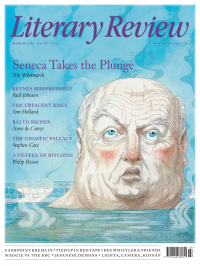Andrew Greig
Names Writ on Water
Landmarks
By Robert Macfarlane
Hamish Hamilton 387pp £20
Robert Macfarlane’s singular talent as a ‘nature writer’ is to combine intellectual rigour, thematic clarity and structure, and leaven these with experiential, personal narratives. His books are philosophical in foundation and scholarly in their scrupulous, generous acknowledgement of sources and influences – things that many writers, for reasons of ego or insecurity, prefer to obscure. The Old Ways, Macfarlane’s previous book, was characteristically both celebration and extended examination of walking and walkways, with glances at the life and works of Edward Thomas. Its narrative episodes contain some of the finest and most haunting writing of his I have read; the opening, in which he impulsively leaves his house to walk through a snowbound landscape, following the moonlit Ridgeway, has stayed with me.
The first chapter of Landmarks, ‘The Word-Hoard’, sets out its stall: ‘This is a book about the power of language – strong style, simple words – to shape our sense of place.’ It is also about the writers who have shaped Macfarlane’s sense of the possibilities of nature writing. Some

Sign Up to our newsletter
Receive free articles, highlights from the archive, news, details of prizes, and much more.@Lit_Review
Follow Literary Review on Twitter
Twitter Feed
Literary Review is seeking an editorial intern.
Though Jean-Michel Basquiat was a sensation in his lifetime, it was thirty years after his death that one of his pieces fetched a record price of $110.5 million.
Stephen Smith explores the artist's starry afterlife.
Stephen Smith - Paint Fast, Die Young
Stephen Smith: Paint Fast, Die Young - Jean-Michel Basquiat: The Making of an Icon by Doug Woodham
literaryreview.co.uk
15th-century news transmission was a slow business, reliant on horses and ships. As the centuries passed, though, mass newspapers and faster transport sped things up.
John Adamson examines how this evolution changed Europe.
John Adamson - Hold the Front Page
John Adamson: Hold the Front Page - The Great Exchange: Making the News in Early Modern Europe by Joad Raymond Wren
literaryreview.co.uk